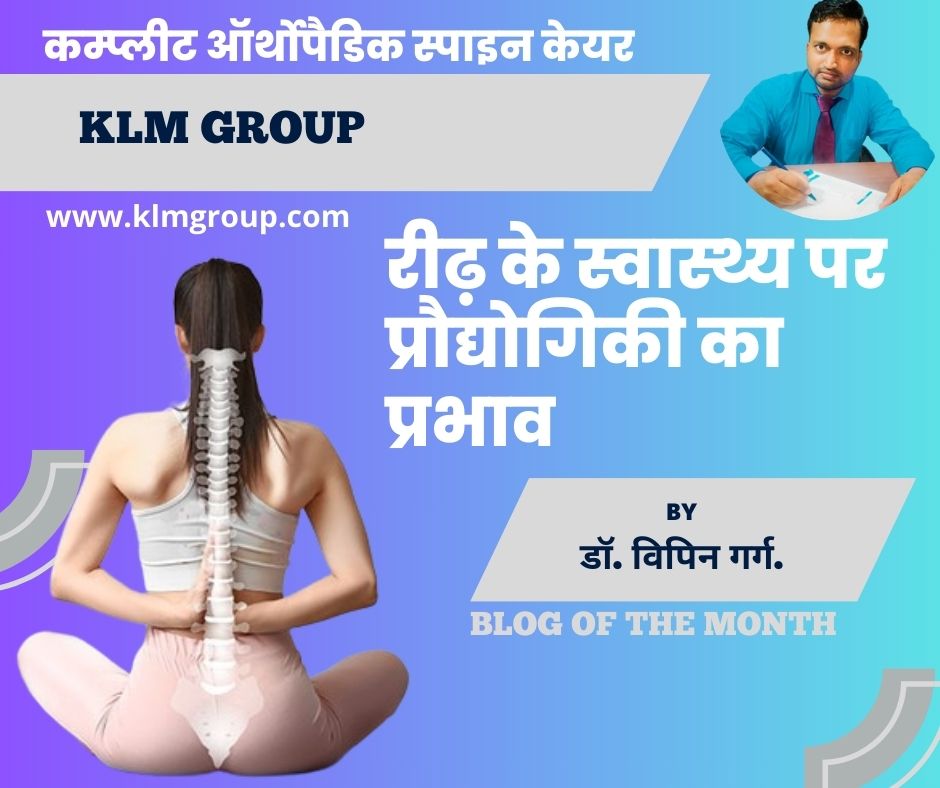The Impact of Technology on Spine Health: In today’s digital age, technology has become an integral part of our daily lives. From smartphones and tablets to laptops and desktop computers, we rely on these devices for work, communication, entertainment, and information.

While technology has undoubtedly improved our lives in many ways, excessive use of these devices can take a toll on our spine health, leading to a condition known as “tech neck.” In this comprehensive guide, we will explore the impact of technology on spine health and share tips for preventing and managing tech neck, with insights from Dr. Vipin Garg and the KLM Group in Gwalior. We can discuss some more about “The Impact of Technology on Spine Health” in this article.
Understanding “Tech Neck”
“Tech neck,” also known as text neck or forward head posture, refers to the strain and discomfort that can result from prolonged use of handheld devices or sitting in front of a computer for extended periods. When we use these devices, we often hunch forward, crane our necks downward, and round our shoulders, placing excessive stress on the muscles, ligaments, and joints of the cervical spine (neck).

Read More:
The Impact of Technology on Spine Health
The widespread use of technology has led to an increase in musculoskeletal issues related to poor posture and sedentary behavior. Some of the ways in which technology can impact spine health include:
- Forward Head Posture: Constantly looking down at screens can cause the head to jut forward, resulting in misalignment of the cervical spine and increased pressure on the neck muscles and discs.
- Muscle Imbalances: Prolonged sitting and repetitive movements associated with technology use can lead to muscle imbalances, with certain muscles becoming tight and overactive, while others become weak and underactive.
- Neck and Shoulder Pain: The repetitive strain on the neck and shoulders can cause pain, stiffness, and discomfort, which may worsen over time if left untreated.
- Reduced Mobility: Poor posture and sedentary behavior can contribute to reduced flexibility and mobility in the spine, making it more difficult to perform daily activities and maintain proper alignment. We can discuss see more about “The Impact of Technology on Spine Health” in this article.
Preventing and Managing “Tech Neck”
Fortunately, there are several strategies that individuals can employ to prevent and manage tech neck and promote spine health:
- Maintain Good Posture: Practice proper ergonomics by keeping your spine straight, shoulders relaxed, and head aligned with your shoulders while using electronic devices.
- Take Frequent Breaks: Take regular breaks from technology use to stretch and move around. Set reminders to take breaks every 30-60 minutes to rest your eyes and stretch your neck and shoulders.
- Use Devices at Eye Level: Position screens at eye level to reduce strain on the neck and avoid looking down for extended periods.
- Practice Neck Exercises: Incorporate neck exercises and stretches into your daily routine to strengthen the muscles of the neck and improve flexibility.
- Use Ergonomic Accessories: Invest in ergonomic accessories such as ergonomic chairs, adjustable desks, and laptop stands to promote better posture and reduce strain on the spine.
- Stay Active: Engage in regular physical activity such as walking, swimming, or yoga to strengthen the muscles supporting the spine and improve overall posture.
Expert Advice from Dr. Vipin Garg and the KLM Group
As a leading orthopedic surgeon at the KLM Group in Gwalior, Dr. Vipin Garg specializes in the diagnosis and treatment of spine conditions, including tech neck. With a holistic approach to spine health, Dr. Garg and his team offer personalized treatment plans tailored to each patient’s unique needs and lifestyle.
At the KLM Group, patients have access to state-of-the-art diagnostic technology and a multidisciplinary team of experts who work together to provide comprehensive spine care. From conservative treatments such as physical therapy and ergonomic counseling to minimally invasive procedures and surgical interventions, Dr. Garg and his team offer a range of options to help patients prevent and manage tech neck and other spine-related issues. We can find some more about “The Impact of Technology on Spine Health” in this article.
Conclusion: Spine Doctor In Gwalior
While technology has revolutionized the way we live and work, it’s essential to be mindful of its impact on spine health. By practicing good posture, taking regular breaks, and incorporating neck exercises into our daily routine, we can reduce the risk of developing tech neck and other spine-related problems. With expert guidance from professionals like Dr. Vipin Garg and the dedicated team at the KLM Group, individuals can take proactive steps to protect their spine health and enjoy a pain-free, active lifestyle in today’s digital world.
Book Your Consultation
Website: https://tinyurl.com/yyzvwmck
Email: info@klmgrou p.org
Ph: 0751-4000721,Mob: 7804826825
Address: 12, Saraswati Nagar, University Road, Near Silver Estate, Thatipur,
Address Link: https://g.page/r/CQ0WqKLEXPWeEAE Powered By Argusdna Also for the best, Orthopedic doctor and surgeon in Kolkata visit www.bonedoctorgautam.com

